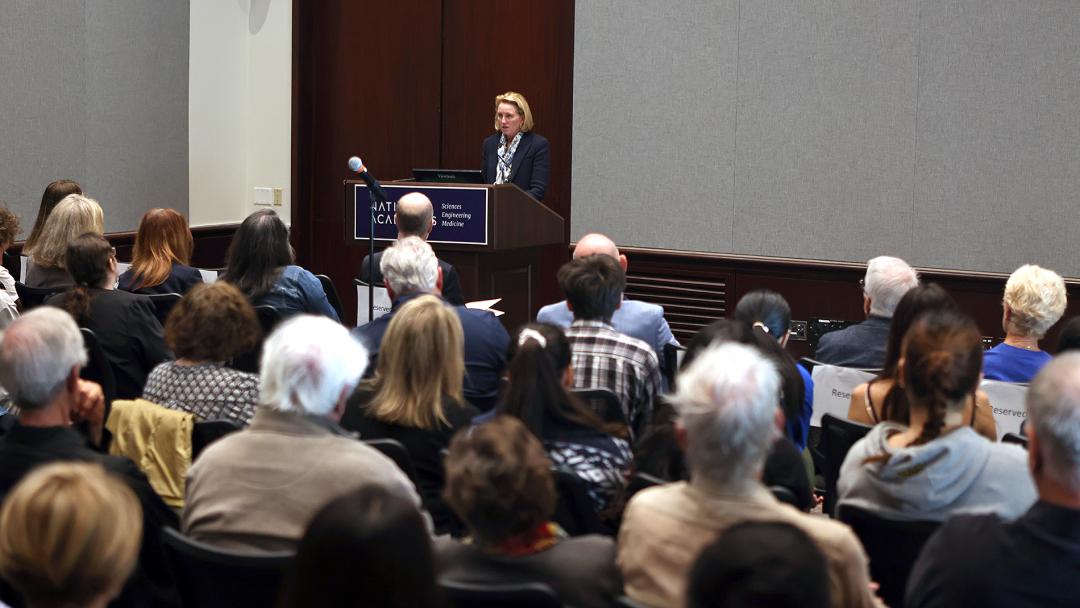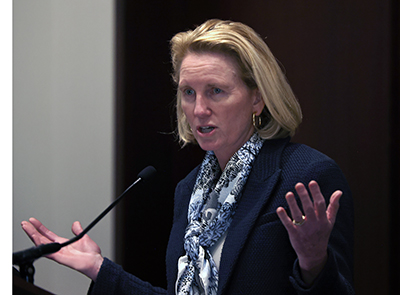
Ambassador Isobel Coleman spoke on campus March 19 as part of the School of Social Ecology's speaker series on contemporary policy issues. Photos by Karen Tapia
Former USAID official urges support for foreign aid amid uncertainty
Speaking to an attentive audience of more than 100 faculty, staff, students and community members March 19 at UC Irvine, former United States Agency for International Development (USAID) Deputy Administrator Isobel Coleman made a passionate case for the value of U.S. foreign assistance, even as the agency faces an uncertain future.
 “I see foreign aid very much through the lens of self interest,” she said. “When we help others, we help ourselves.”
“I see foreign aid very much through the lens of self interest,” she said. “When we help others, we help ourselves.”
For example, Ambassador Coleman pointed out that when America halts the spread of disease overseas, “it is less likely to reach our own shores; we’re healthier and safer.”
She added that the end of U.S. foreign assistance could lead to nearly a one-third increase in tuberculosis cases. “Some of those are likely to reach the United States and could lead to enormous expense — a single case of drug-resistant TB can cost half a million dollars to manage,” she said.
Coleman’s lecture was part of UC Irvine’s School of Social Ecology speaker series on contemporary policy issues.
“The School of Social Ecology is engaged with issues confronting the community, and we are committed to hosting special lectures to learn more about policies that affect people’s lives,” said Jon Gould, dean of the School of Social Ecology.
Coleman’s visit comes as USAID faces an uncertain future, with most of its programs canceled and staff being laid off following a review by President Donald Trump’s administration. A federal judge recently ruled the shutdown was likely unconstitutional, but its ultimate fate remains unclear.
“The courts will undoubtedly continue to battle over the legal questions at stake. But in the meantime, USAID has essentially been dismantled,” Coleman said. “On March 10, Secretary of State Marco Rubio announced that a six-week review had been completed, canceling 83 percent of USAID’s programs, including programs that apparently had a waiver because they were deemed so critical.”
She argued that foreign aid serves U.S. interests by improving global health, fostering economic growth and stability, and countering the influence of countries like China. She noted that USAID's entire budget accounted for under a quarter of 1 percent of federal spending.
While acknowledging the need for reforms, Coleman criticized the abrupt dismantling of USAID as shortsighted. She warned it could lead to millions of deaths as lifesaving programs are halted.
Looking ahead, Coleman called for a thoughtful restructuring of U.S. foreign assistance efforts. She suggested incorporating USAID's work into State Department regional bureaus while maintaining dedicated humanitarian and development expertise.
Coleman concluded by quoting Bono, who called U.S. development assistance “as close to poetry as policy gets.”
During the audience question and answer session, Coleman encouraged continued American leadership in global development, calling it essential for moral and strategic reasons.
A student asked what young people interested in international relations have to look forward to during these divisive times.
Coleman’s response: “With the amount of divisiveness in this country right now, finding some shared common starting point is essential. Think about the world going forward. Don't give up all sense of hope and idealism.… We, as a country, will settle into an equilibrium that is not as extreme on either side… and we need good talented young people to be willing to go into public service. Be strong and be true to your North Star.”
Peggy Bockman, a retired university administrator who attended the event, said she was glad to see the diverse audience engaged with the topic.
“Ambassador Coleman is quite impressive,” she said. “She is a gifted speaker and passionate advocate, despite the recent USAID disaster. Her commentary left us with hope. Our country needs intelligent, experienced individuals like her as our thought leaders.”
— Mimi Ko Cruz
Orange County Register: USAID suspension will strengthen China and exacerbate suffering, former official says during UCI talk
Event photos are available on Flickr